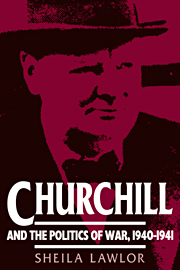Book contents
- Frontmatter
- Contents
- Acknowledgements
- List of abbreviations
- Introduction
- Retrospect
- Part 1 Churchill, the conservative party and the war
- Part 2 The Middle East, imperial defence and the Balkans (October to December 1940)
- Part 3 The Greek Decision (January to March 1941)
- General conclusion
- Bibliography
- Index
- Frontmatter
- Contents
- Acknowledgements
- List of abbreviations
- Introduction
- Retrospect
- Part 1 Churchill, the conservative party and the war
- Part 2 The Middle East, imperial defence and the Balkans (October to December 1940)
- Part 3 The Greek Decision (January to March 1941)
- General conclusion
- Bibliography
- Index
Summary
This book opens with Churchill's coming to power as prime minister in May 1940. Although he had been brought into government after the outbreak of war in September 1939, he had been out of office for the previous decade. Since the First World War, the character of politics had been determined, not by Churchill, but by Baldwin and Chamberlain. They had led the conservative party since 1923; and they had either led or dominated government throughout that time – except for the short periods of Ramsay MacDonald's labour administrations. In the 1920s this had been a matter of conservative governments between 1922 and 1929 interspersed with MacDonald's brief period of office in 1924, and after the labour government of 1929–31, the national government of the 1930s was very much under the conservative aegis. Though led until 1935 by MacDonald, the real influence was thought to lie with Baldwin. Once MacDonald stepped down in 1935 Baldwin took over as prime minister until 1937 when he, in turn, stepped aside for Neville Chamberlain.
Much of Churchill's support in May 1940 came from those who had throughout the 1930s set themselves against the national government in general or Neville Chamberlain in particular: the labour party which had gone into opposition and expelled MacDonald when he formed a national government; the Lloyd George liberals who withdrew support after a general election was called and the main group of Samuelite liberals who withdrew after the 1932 Ottawa agreement; those conservatives who, for a variety of reasons, continued to set themselves apart from their leaders; and the cross party groups of critics and sceptics which met after the outbreak of war.
- Type
- Chapter
- Information
- Churchill and the Politics of War, 1940–1941 , pp. 25 - 30Publisher: Cambridge University PressPrint publication year: 1994

